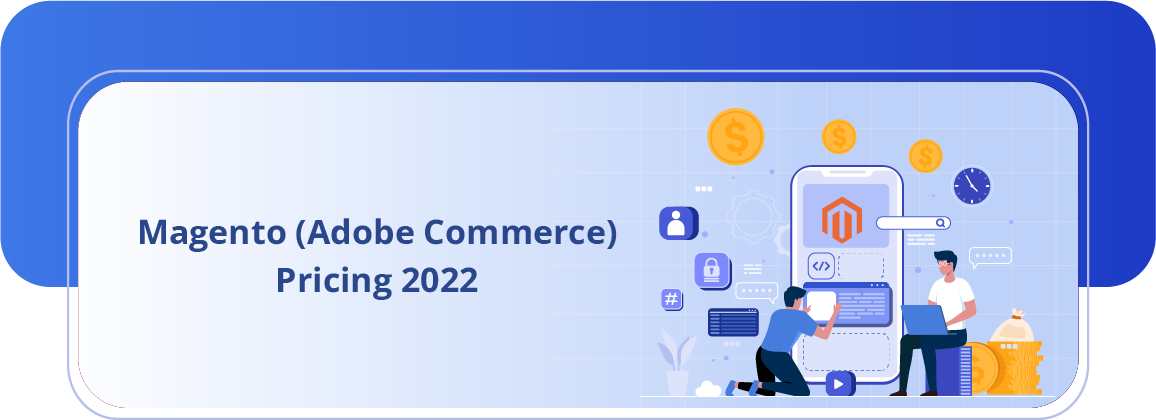Magento (Adobe Commerce) Pricing
– Everything You Need To Know

Adobe Commerce is a popular eCommerce platform used by many online stores to build and manage their eCommerce outlets. While Adobe Commerce offers amazing features and functionality, the cost is an important decision-making criterion.In this blog, we’ll give you an overview of the various cost heads and tentative costs required to build an Adobe Commerce store. Please note, the platform cost is only one component of the overall cost and a number of factors determine what you spend to go live with your eCommerce store.
To make this easy to understand, we’ve broken it down into parts:
The Big Question: How much does a Magento/ Adobe Commerce site cost?
Before we begin, we would like to caution our readers about the cost trap. What is cost trap? We have far too often seen businesses evaluate and chose platforms on cost ALONE. We have seen them fail and pay a hefty price for it in the form of delayed go to market and re-platforming costs. It is not fair to evaluate these platforms on the parameter of cost alone.
Each one of these platforms offers something unique and it is important to choose the one that best meets your requirements. It can be overwhelming, but it must be done. If you need a helping hand to understand and document your requirements let us know and we will be happy to help. For example, consider this, Magento/ Adobe Commerce offers various options like Open Source, Commerce, and Commerce Cloud and is used by businesses of all shapes and sizes. They offer different features and cost different (license and development).
| Open Source | Adobe Commerce On-premise | Commerce Cloud | |
|---|---|---|---|
| Core Functionality | Yes | Yes | Yes |
| Advanced Native Functionality | Yes | Yes | |
| Technical Support | Yes | Yes | |
| Hosting & Performance | Yes | ||
| Licensing Model | Free | Tiered pricing bases on Gross Merchandise Value (GMV) | Tiered pricing based on Gross Merchandise Value (GMV) |
* Open Source as a standalone product, offers amazing features and is competitive to most other eCommerce platforms out there. The limited functionality term is used in comparison with Adobe Commerce and Adobe Commerce Cloud. While there are certain differences, with Adobe Commerce, its extensibility, customization capability, and the ecosystem (partner & app) remain as its most powerful differentiators. There are so many different variables to building an eCommerce store, that it’s impossible to say for sure how much building an eCommerce store will cost, without first understanding the business and goals. We, therefore, ask our clients what specifically they want to achieve when they ask us how much they may expect to spend on their website. It is a collaborative exercise to determine the tentative total cost of ownership. You don’t have to do this alone, let us know if you need any help.
Who Should Read This Magento / Adobe Commerce Pricing Blog?
This blog is written for business owners, eCommerce directors, and decision makers who are evaluating and exploring an investment in Adobe Commerce/ Magento. Whether you’re building a new site, re-platforming from another eCommerce store, or upgrading from an earlier version Magento, this blog is for you. Are you debating if Adobe Commerce is a good fit for your company and looking for some answers? Read on and you might just find what you are looking for. If you don’t, drop us a note and will be happy to answer them. Now, let’s get into the nitty-gritty.
Magento/ Adobe Commerce Licensing Costs
The license cost is what you pay to Adobe for the platform.
| Open Source | Adobe Commerce On-premise | Commerce Cloud | License Cost |
|---|---|---|---|
| Licensing Model | Free | Tiered pricing bases on Gross Merchandise Value (GMV) | Tiered pricing based on Gross Merchandise Value (GMV) |
| License Cost | $22,000 | $40,000 | |
| < $1,000,000 | $32,000 | $55,000 | |
| $1,000,000 – $5,000,000 | $49,000 | $80,000 | |
| $5,000,000 – $10,000,000 | $75,000 | $120,000 | |
| $10,000,000 – $25,000,000 | $125,000 | $190,000 | |
| $25,000,000+ | $22,000 | $40,000 |
Note – These are indicative pricing as there are other factors that decide what you pay for the license. Talk to us if you need help in getting a competitive quote on Adobe Commerce or Adobe Commerce Cloud.
Magento/ Adobe Commerce Pricing – Other Cost Heads to Consider
Consider this,
- Have you compared the various options available – Magento Open Source, Adobe Commerce, and Adobe Commerce Cloud? Do you know which one is the best for your business?
- This includes understanding the features you require, hosting requirements, on-going support, and more.
- Do you know if there are any business specific processes/ workflows that may require extensions or customization to the Adobe eCommerce store.
- Note – At times that functionality is available by default (in the same or higher version) but customers are not aware of them.
- Are you conscious of third-party costs that can impact your total cost of ownership like shipping, payments, etc.
In addition to the license cost, there are additional considerations/ cost heads that decide the total cost of ownership. Let us look at those additional factors:
Hosting
Magento hosting costs can vary from $15 to $800 month depending on a server’s features, support, and security. Since Magento is a resource-intensive platform, it is important to choose a hosting provider carefully. Remember, hosting services will manage your website’s security, speed, and domain requirements, so it’s necessary to choose good service providers. See the importance of hosting when working with Magento eCommerce.

There are three types of Magento web hosting services:
Shared Hosting – Under this setup, you will be sharing your server and resources with other websites through a shared hosting plan. It is more affordable than other hosting options, but your site will be more vulnerable to security threats due to a poor environment.
Dedicated Hosting – This type of hosting allows you to host an entire server. This type of hosting is more secure, but it comes at a fixed price. Thus, even if you don’t use all of the resources, you still have to pay the full amount.
Cloud Hosting – Cloud hosting is the best choice for hosting as it gives you a flexible solution and dedicated resources.
| Open Source | Adobe Commerce On-premise | Commerce Cloud | |
|---|---|---|---|
| Hosting | Needs a host | Needs a host | Hosting included |
No matter whether you choose to go with Magento Open Source, Commerce, or Commerce Cloud, there are additional expenses that businesses will have to pay to develop and maintain the eCommerce store. The other cost overheads include:
- Design and Development
- Cost of Customization
- Cost of Extensions
- Ongoing Support and Maintenance
- Ongoing Expenses – for shipping, payments, etc.
Magento Domain Name Your domain name is your URL that acts as your unique address on the internet, using which people will discover your Magento store. A new domain name will cost between $ 1 to $ 15 per year. A domain that is expired can be costing you between $ 20 and $500 per year, depending on its domain authority.
Security Certificates Secure Sockets Layer protects your online store against any cyber threat while also acting as a positive influence on your website SEO. It encrypts sensitive data between your customers, and checkout system, e.g., the credit card details, thus making your website more trustworthy. The cost of SSL certificates is generally between $0 to $600 per annum. However, your hosting service provider will include a free SSL in your hosting plan in most cases.
Magento SEO And Marketing You can expect to spend anywhere between $1000-$4000 for SEO and digital marketing, depending on the competitiveness of your niche.
Store Maintenance Your store will require a few fixes, troubleshooting, and optimization, as well as adding new features on a regular basis. The Magento Developers might charge you between $65 to $150 per hour for website maintenance-related work.
One-Time Costs In this section, we will go through the one-time payments you need to make in order to build your Magento-powered eCommerce store:
| One-Time Costs | Cost Range |
|---|---|
| Magento (Adobe Commerce) Themes + Magento Developer’s Fee | $ 20 to $ 1000 + $ 15 to $ 100 (per hour) |
| Magento (Adobe Commerce) Extensions | $1000 to $3000 |
Magento (Adobe Commerce) Themes
Magento themes can be purchased for between $ 20 and $ 1000, depending on whether you choose a premium option that is often bundled with additional extensions. You can also buy a basic theme at a low price and have your frontend Magento developer customize it while also creating your own theme with the help of the developer.
Alt Tag: In this image, a Magento developer at i95Dev is shown
Keep in mind that depending on the level of their experience, Magento developers can cost between $ 15 to $ 100 an hour.
Magento (Adobe Commerce) Extensions
Magento provides over 5,500 extensions, with their prices ranging from $0 to $2000.
Again, the cost of functionality depends on how much you need. You will require at least 5-10 extensions to your store. Depending on which extension you choose, this can run you anywhere from $1000 to $3000. You can also purchase extensions and have them customized by a developer. Developer charges, in this case, will be higher than themes because extensions can be customized backend-by-backend while they can also be built from scratch.
| Open Source | Adobe Commerce On-premise | Commerce Cloud | |
|---|---|---|---|
| Hosting | $15 to $800 | $15 to $800 | |
| Domain Name | $ 1 to $ 15 (New Domain) / $ 20 to $500 (Restoring Expired Domain) per annum | $ 1 to $ 15 (New Domain) / $ 20 to $500 (Restoring Expired Domain) per annum | $ 1 to $ 15 (New Domain) / $ 20 to $500 (Restoring Expired Domain) per annum |
| SSL Certificates | $0 to $600 per annum | $0 to $600 per annum | $0 to $600 per annum |
| Cost of Extensions | $1000 to $3000 | ||
| Ongoing Support & Maintenance | $65 – $150/ hr | $65 – $150/ hr | $65 – $150/ hr |
| Other Ongoing Expenses (for shipping, payments, etc.) | |||
| Marketing & Promotions (SEO, Paid) | >$4,000 | >$4,000 | >$4,000 |
| Open Source | Adobe Commerce On-premise | Commerce Cloud | |
|---|---|---|---|
| Core Functionality | Yes | Yes | Yes |
| Advanced Native Functionality | Additional Cost (Extensions) | Yes | Yes |
| Technical Support | Additional Cost | Yes | Yes |
| Hosting & Performance | Yes | ||
| Tentative TCO | >$15,000 | >$30,000 | >$50,000 |
| Ideal for | Small B2C businesses with a reliable in-house team or partner agency. | Mid-sized to Large B2B and B2C businesses with advanced eCommerce and performance needs and have a reliable in-house team or partner agency. | Mid-size to Large B2B and B2C businesses with advanced eCommerce and performance needs but do not want to take care of their own hosting. |
Is It Better to Manage Your Magento Website In-House or Hire a Magento Agency?
The two options for maintenance are: internal Magento experts or an external Magento agency. There are many merchants who find it impossible or impractical to have in-house. The cost of payroll, training, benefits, and hiring adds up quickly. You can simplify your overhead by partnering with a Magento agency. Additionally, if you hire an agency, you have access to their experience with other eCommerce industries and retailers as well.
Practical Tips & Reality Checks
When choosing which Magento version is best for you and which options meet your budget, take into account the following factors. Here’s a list of tips and best practices to keep in mind when considering a Magento site.
- Be aware of your spending limits.
- Ask for assistance when required.
- Prioritize quality over expediency and cost.
- Consult a Magento agency or specialist.
- Be selective while considering a partner.
- Your agency ought to be committed to your success.
Send us an email at info@i95dev.com if you need assistance choosing which Magento version is best for your company.
Wrap Up
These are just a few among the many critical factors that will determine the pricing for your Magento Store. To get a complete overview of the pricing for your Magento-based eCommerce store, get in touch with i95Dev and benefit from our experts’ advice without any additional charges.
Recent Blogs
22 benefits ecommerce home decor furniture businesses
22 Benefits of eCommerce for Home Décor and Furniture Businesses Author Category Share Home décor and furniture businesses are increasingly turning to eCommerce to elevate their operations...
Home Improvement Industry: 11 Key eCommerce Features Consider
Elevating Home Improvement eCommerce: 11 Must-Have Features for a Seamless Shopping Experience Author Category Share In the dynamic landscape of home improvement, furniture, and lifestyle,...
Complete Guide to Automotive eCommerce Growth, Trends, Challenges, Solutions
A Comprehensive Guide to Accelerate Your Automotive Business Growth with eCommerce Author Category Share Introduction The automotive industry has undergone a significant transformation in...




